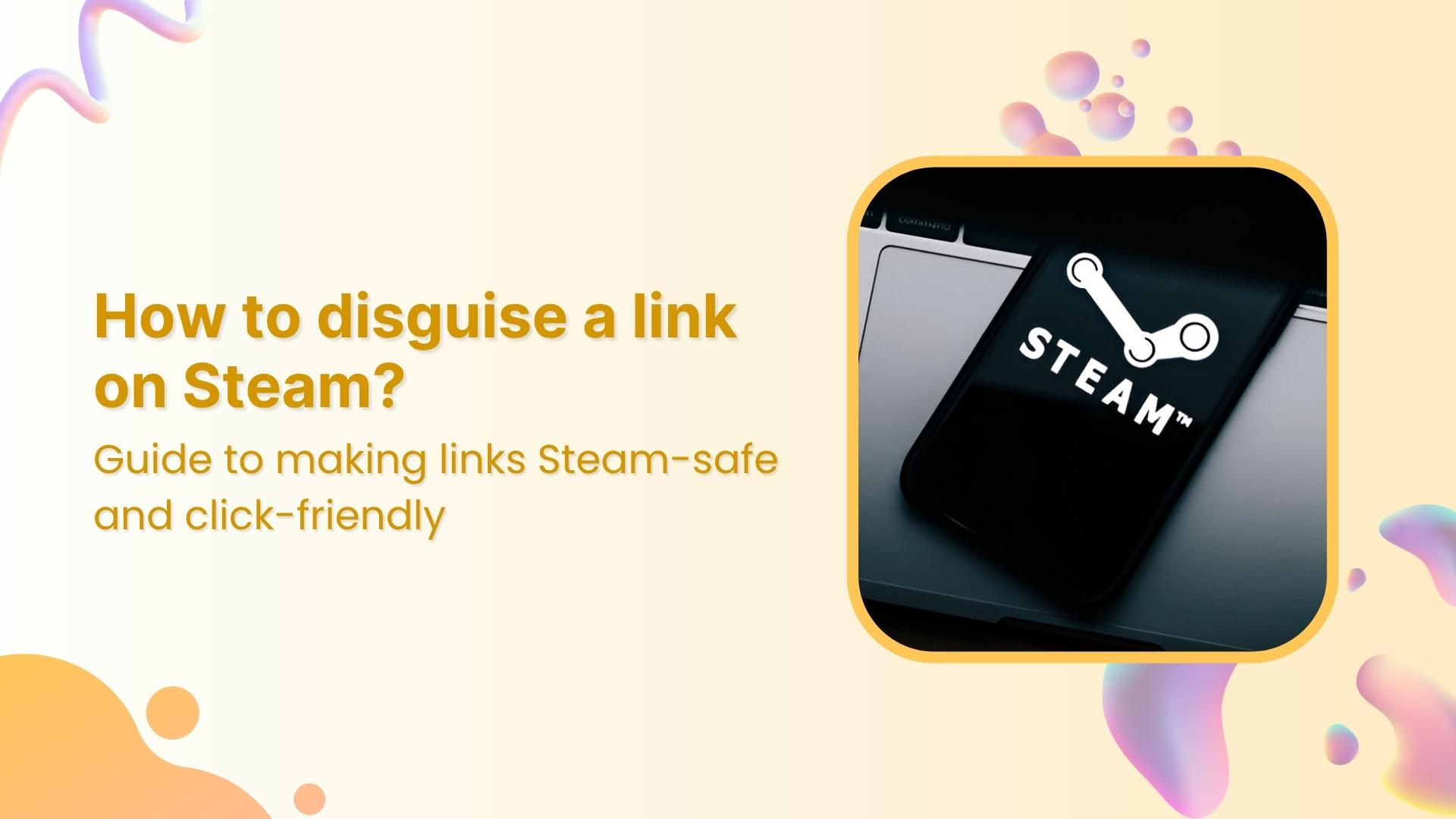Steam doesn’t like links.
If you’ve ever dropped one in a profile, review, or comment and saw {LINK REMOVED}, you’re not alone. Steam is notoriously picky about what it allows, especially when it comes to external URLs.
So… what kind of links do work?
Steam is more likely to allow links that:
- Use your own custom or branded domain
- Don’t include query strings or tracking parameters
- Avoid trailing slashes or deep folder paths
In this guide, we’ll break down:
- Why your links are getting removed
- What not to do
- And how to disguise (or cloak) links on Steam using Replug, without raising red flags
Branded Short Links
Create and track branded short links for your business for better conversions.
Brand Your Links Now!
Why do Steam links matter?
Steam isn’t just a game store; it’s where communities connect, share updates, and grow. But when links get filtered, your message gets lost. Here’s why those links matter:
| Steam is home to… | Links are used to… | But if filtered… |
| Player reviews | Promote giveaways | Giveaway goes unseen |
| Group discussions | Share patch notes and updates | No one sees the latest changes |
| User profiles | Drive traffic to Discord, Twitch, and other socials | Zero clicks, zero engagement |
| Workshop content | Link to press kits, FAQs, or community rules | Users miss important resources |
| Game update posts | Share detailed changelogs or blogs | Your message gets buried |
When a link gets filtered, users miss out, and all the effort you put into engaging your community is lost to a simple {LINK REMOVED}.
Also read: How to disguise a link in Discord: 5 tricks you should know
Why does Steam filter links?
Steam’s link filtering protects users from scams, spam, and phishing. Here’s what typically triggers removal:
1. Suspicious content
If your post is flagged, Steam may hide all links attached to it,even temporarily until it’s reviewed.
2. Limited accounts
New or restricted accounts have tighter sharing limits, including on external links.
3. Masked or shortened URLs
Links created using public shorteners (like Bitly) often get flagged. Steam doesn’t block them outright, but it treats them with caution, especially in community content and profiles.
4. Uncommon domains or URL parameters
Steam is quick to remove links that:
- Use free or obscure domains (like .top, .xyz, .tk)
- Contain UTM parameters (?utm=, ?ref=, etc.)
- Include folders or slugs after the domain (like /page or /offer)
Even a legitimate link can be flagged just because of how it’s formatted.
What kind of links are likely to be removed?
Here are some examples that often get filtered:
Why? They either use public shorteners, contain parameters, or come from uncommon domains.
How to disguise a link on Steam using Replug?
Replug is a link management tool that works as a Bitly alternative (or any other link management tool), but gives you more control over your links’ appearance and performance.
It’s especially useful when you need links that look clean, simple, and trustworthy.
Link Management Made Easy
Your go to link management tool for CTAs, branded and bio links, QR Codes, tracking and retargeting.
Get Started for FREE!
Let’s give you a rundown of how you can disguise a link in Replug using an example URL:
Step 1: Log in or sign up
Go to the Replug app and log in to your account. If you don’t have an account, you can sign up and get access to a 14-day trial with full features.
Step 2: Shorten your Steam URL
Copy and paste your URL in the bar under “Quickly Shorten your link” on Replug’s homepage.
Step 3: Create a custom, disguised URL
Next, create a custom URL by connecting your branded domain and changing the URL slug in Replug.
Step 4: Enable “Link Cloaking”
From the side menu, toggle the “Link Cloaking” feature. It keeps the short link visible in the browser’s address bar, hiding the original URL, UTM parameters, or any messy redirects. The result? A clean, authentic-looking link that doesn’t raise red flags on Steam.
Also read: How to disguise a link in text: Step-by-step guide
Step 5: Save your shortened, disguised URL
Once everything looks good, hit “Save Shortened URL”. Your disguised link is now ready, short, clean, and stealthy. No messy parameters, no giveaways. Just a solid link that blends right in.
Quick dos and don’ts
| Do this | Avoid this |
| Use your own branded domain | Use public shorteners |
| Keep links short and clean | Add parameters or slashes |
| Test before posting | Use uncommon domain extensions |
| Track behind the scenes with Replug | Show UTM codes or referral tags |
Conclusion
Steam filters links to protect users, but that doesn’t mean you can’t share them.
Just avoid shorteners, parameters, and uncommon domains.
If you want to track your links, customize how they look, and still play by Steam’s rules, a branded domain with Replug is the way to go.
Looking for a Bitly alternative that helps you share Steam-friendly links?
Try Replug and disguise your Steam links without getting banned!
FAQs on how to disguise a link on Steam
How do I disguise a link on Steam without getting {LINK REMOVED}?
Use a branded domain, keep it clean (no UTM parameters, slashes, or folders), and enable link cloaking. Tools like Replug let you create short, authentic-looking URLs that are less likely to get flagged.
Can I use Bitly links on Steam?
Technically, yes; but it’s risky. Public shorteners like Bitly are more likely to be flagged, especially in profiles or community posts. Steam doesn’t always block them, but they often trigger moderation filters.
Is Replug safe to use with Steam?
Yes. Replug lets you use your own domain, cloak links, and track clicks behind the scenes. As long as your links follow Steam’s formatting expectations, Replug helps you stay compliant and get insights.
What kind of links are safest to use on Steam?
Links that:
- Use your own custom/branded domain
- Have no UTM parameters or referral tags
- Don’t include trailing slashes or deep paths
- Look simple and direct
These are less likely to raise suspicion.
Why does Steam remove my links?
Steam filters out links that look suspicious — to protect users from scams or spam. Common triggers include:
- Public shorteners (like Bitly, TinyURL)
- URLs with tracking parameters (e.g., ?utm_source=)
- Uncommon domains like .xyz, .tk, or .top
- Any link shared from a restricted or new account
How does link cloaking help on Steam?
Link cloaking keeps your branded short link visible in the address bar, even after redirection. It hides tracking parameters and destination URLs, making the link appear clean and trustworthy, especially on sensitive platforms like Steam.

































